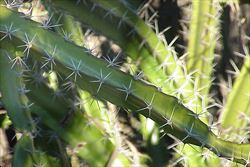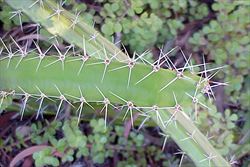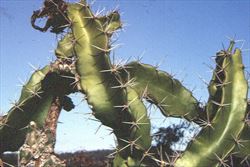Click on images to enlarge

infestation in a brigalow woodland (Photo: Sheldon Navie)

fleshy, angled, stem segments covered in spines (Photo: Sheldon Navie)

close-up of spines (Photo: Sheldon Navie)

stems damaged by the mealybug Hypogeococcus festerianus (Photo: Sheldon Navie)
Scientific Name
Acanthocereus tetragonus (L.) Hummelinck
Synonyms
Acanthocereus pentagonus (L.) Brit. & RoseCactus pentagonus L.Cereus pentagonus (L.) Haw.
Family
Cactaceae
Common Names
barbed wire cereus, barbed-wire cactus, sword cactus, sword pear, sword-pear, triangle cactus
Origin
Native to south-eastern USA (i.e. Florida and Texas), Mexico, Central America (i.e. Belize, Costa Rica, Guatemala, Honduras, Nicaragua and Panama), the Caribbean and northern South America (i.e. Venezuela).
Naturalised Distribution
Naturalised in central Queensland. Also naturalised overseas in Hawaii and New Caledonia.
Notes
Sword pear (Acanthocereus tetragonus) is regarded as an environmental weed in Queensland. This species currently a problem plant in the semi-arid rangelands of central Queensland, particularly in brigalow woodlands. However, it is also thought to have significant potential as an environmental weed in south-eastern Queensland and the Northern Territory.
It has escaped cultivation as a garden ornamental, as have many other introduced cacti, and is most problematic in the Gogango area west of Rockhampton. Sword pear (Acanthocereus tetragonus) is also regarded as a priority weed species in the Emerald Shire, where it is a declared pest plant under local law. A single population is present in this shire, at Fernlees south of Emerald. Some biological control of this species is provided by a mealy bug (i.e. Hypogeococcus festerianus) that was introduced to control harrisia cactus (Harrisia martinii).
Sword pear (Acanthocereus tetragonus) is also naturalised in dry secondary scrubland on the southern coast of Kauai in Hawaii.

